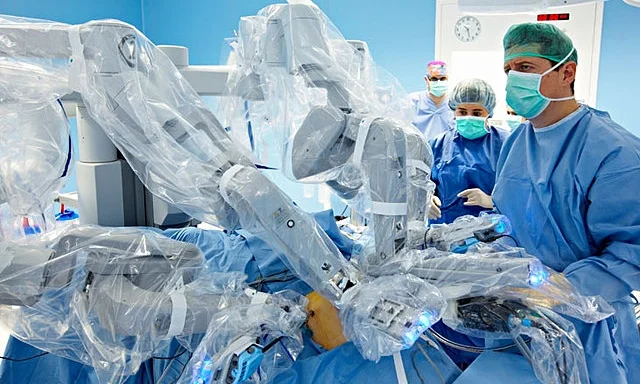Robotics in Healthcare A Precision Revolution
Robotics has made significant strides in the field of healthcare, revolutionizing surgical procedures and patient care. By offering unparalleled precision, accuracy, and minimal invasiveness, robotic systems are transforming the way medical professionals approach complex surgeries and patient rehabilitation.
Robotic Surgery: A Precision Tool
Robotic surgery involves the use of robotic systems controlled by surgeons to perform minimally invasive procedures. These advanced systems offer several advantages:
- Enhanced Precision: Robotic arms provide surgeons with greater dexterity and control, allowing for more precise and delicate movements.
- Minimally Invasive Procedures: Robotic surgery often involves smaller incisions, leading to reduced pain, faster recovery times, and less scarring.
- Improved Patient Outcomes: Robotic surgery can result in better patient outcomes, including reduced blood loss, shorter hospital stays, and fewer complications.
Robotic Rehabilitation: A Path to Recovery
Robotic rehabilitation devices are designed to assist patients in regaining mobility and function after injuries or illnesses. These devices provide targeted therapy and exercise, helping patients recover faster and more effectively.
- Exoskeletons: These wearable devices support and enhance human movement, aiding in rehabilitation and providing assistance to individuals with disabilities.
- Robotic Therapy Systems: These systems provide guided exercises and therapy, helping patients regain strength, balance, and coordination.
Challenges and Future Directions
While robotic technology has made significant advancements, there are still challenges to overcome:
- Cost: Robotic systems can be expensive, limiting their accessibility in certain healthcare settings.
- Training and Skill Acquisition: Surgeons and therapists require specialized training to operate robotic systems effectively.
- Ethical Considerations: As robots become more advanced, ethical questions arise regarding autonomy, accountability, and the human touch in healthcare.
The future of robotics in healthcare is promising. Advancements in artificial intelligence and machine learning will further enhance the capabilities of robotic systems, enabling them to perform more complex tasks and provide personalized care. By addressing the challenges and embracing ethical considerations, we can harness the power of robotics to improve patient outcomes and revolutionize the healthcare industry.
Would you like to learn more about a specific application of robotics in healthcare, such as robotic surgery or rehabilitation therapy?

